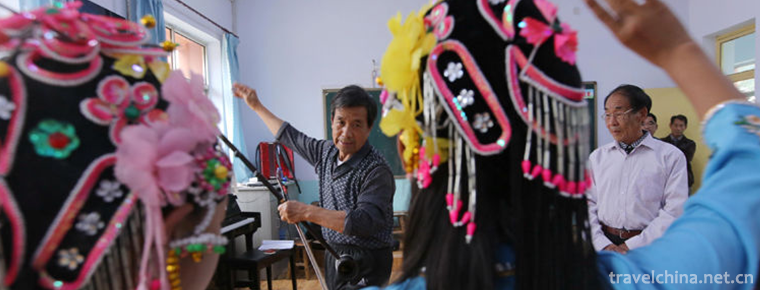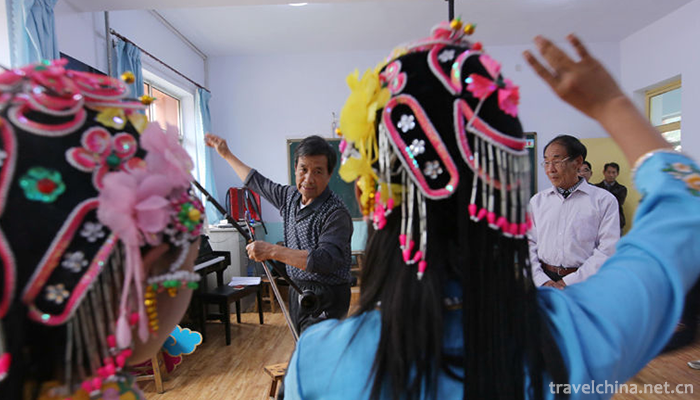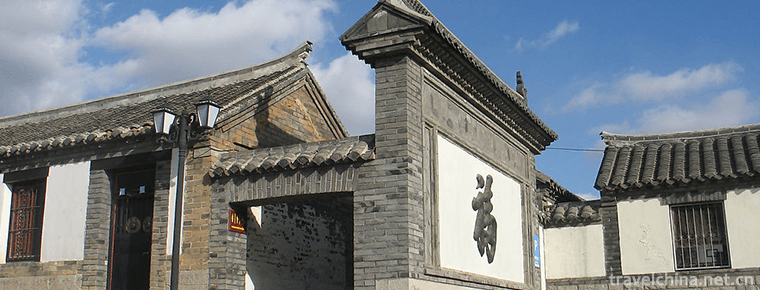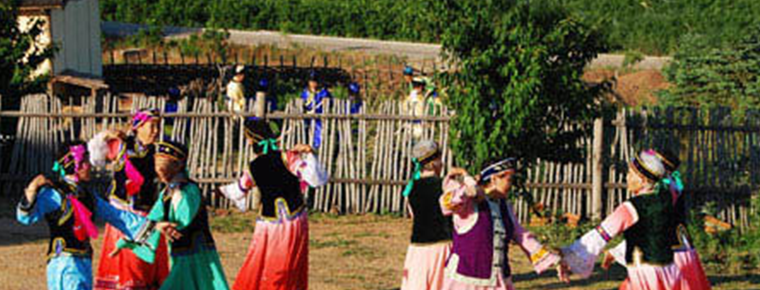2019-01-04

- By ChinaWiki.net
- Chinese Edition
- 2019-07-25
Parrot Opera
Parrot Opera, which originated in the reign of Qianlong in Qing Dynasty, inherited in Shanghe Village, Linzi District, Zibo City, Shandong Province, and is one of the national intangible cultural heritages.
Parrot Opera is a folk opera which imitates the calls of parrots. It is characterized by adding dragging sounds like parrot calls to the singing cavity of each sentence, which is melodious and melodious. The accompaniment of Parrot Opera is mainly percussion music, almost every section has percussion music, and has its own unique musical instrument, Parrot Hu.
On May 23, 2011, the "Parrot Opera" declared by Linzi District, Zibo City, Shandong Province, was approved by the State Council of the People's Republic of China and listed in the third batch of national intangible cultural heritage list, number: IV-146.
historical origin
Parrot Opera originated in Linzi, the capital of Qi State during the reign of Qianlong in Qing Dynasty. It has passed on for seven generations and has a history of more than 250 years.
During the Cultural Revolution, people were scattered, clothing and props were destroyed, performances ceased and partridge opera went to a low ebb. After the crushing of the Gang of Four, the spring of literature and art came, with all kinds of wastes flourishing, and parrot opera recovered immediately.
From 1920 to the eve of the outbreak of the War of Resistance Against Japan, under the leadership of Liu Kezheng and Zhang Zihua, the fifth generation successors, the play had made great progress.
In 1999, Parrot Opera was listed as a rare opera in China.
Cultural characteristics
Tune
Parrot opera is very special in tune. In the middle of each line of singing (especially the evenness plate), there is a dragging tone, which has a sad tone and a happy tone, just like the parrot's song, it is very graceful and turning to listen. This is also the origin of parrot opera.
Music for voices in a Chinese Opera
The percussion music plays a very important role in the musical instruments. Most of the general plays use strings to pull through the door, while the percussion music is used at the beginning and end of the performance, that is, "start-blow-accompaniment-blow-end", which is very special.
Musical Instruments
Apart from other percussion instruments such as erhu, Yueqin and drum used in Peking Opera,
There is also a special musical instrument, the partridge beard, which is bigger than Beijing Hu and smaller than Erhu. It is inherited from history.
The musical instruments come down with rounder and fuller tones than Erhu and more soothing and melodious tones than Jinghu. They sing with partridges.
Sample dragging tones cooperate with each other to form a unique singing tone.
Traditional drama
At present, there are more than 20 traditional large-scale operas that can be performed, such as "Hang Shuai's Expedition", "Yang Paifeng", "Long Bao Temple", "Luo Tong Sao Bei", "Tea Collection Qi Case", "Zhuangyuan Da Geng", "Wufengling", "Mu Guiying Zhengnan", "Yan Zhi", and so on. There are also new series "Tai Gong Zhuan" and reflecting the planned life. Nurturing and pension issues such as "House Repair" and other plays.
Inheritance and Protection
Inheritance value
Parrot opera originates from nature and is close to life. It is a kind of opera which is very close to its geographical environment.
In order to originate from the parrot and express feelings, it maintains the primitive nature, simple and affectionate.
In addition to the high interest, there is a feeling of sadness and seclusion, which is thought-provoking and thought-provoking.
Parrot play has certain academic value because it is a kind of drama originating from natural voice.
With its unique characteristics and appeal, it later absorbed some of the essence of Peking Opera and became a unique drama. The opera has its own quoting, musical instruments and singing, which originate from nature and higher than nature, rooted in the life of the local people, and play a great role in the study of Chinese music, drama, dialects, and literary studies.
Mandarin opera also has high cultural value, because its origin and development place are in Linzi, the capital of Qi State in Zhou Dynasty.
A large part of the content of the performance comes from local historical stories, such as Jiang Taigong. Linzi dialect is the main vocal tune and pronunciation, which provides a reference for the study of Qidi culture.
Current situation of inheritance
In 2000, Zibo Parrot Troupe was founded. After 2001, due to economic constraints, the troupe went from prosperity to depression again. At present, there is a shortage of young actors and old actors. The source of the actors is broken, the color of the actors is not connected, the costumes and props are obsolete and difficult to replace. The Parrot Theatre Troupe is on the verge of extinction.
protective measures
On January 1, 2000, Zibo Parrot Troupe was founded. Qiu Zhengji, a descendant of Jiang's family and Taiwan's honorary head of the troupe, was consulted by Wang Xiaojia, former director of Shandong Art Research Institute.
On April 20, 2000, the National Seminar on Parrot Opera was held in Shanghe Village, Linzi. The Chinese Culture Daily, Daily Mass, Luzhong Morning News, Qilu Sheng Daily, Zibo Daily, Drama Series and the central and local TV and radio stations reported on the parrot opera successively.
In June 2006, Parrot Opera, Cuju and Stepping on Cunzi were published as the first batch of intangible cultural heritage in Zibo.
social influence
Important activities
On April 20, 2000, the National Seminar on Parrot Opera was held in Shanghe Village, Linzi.
Chinese Culture Daily, Mass Daily, Luzhong Morning Post, Qilu Gaobao Daily, Zibo Daily, Drama Series and central and local TV and radio stations have reported on the parrot opera successively.
In July 2014, Yongchang Parrot Opera Troupe performed Baolian Lantern on the stage of Chang'an Grand Theater in Beijing, with a warm response.

Ask a Question
Your email address will not be published.



0 Questions